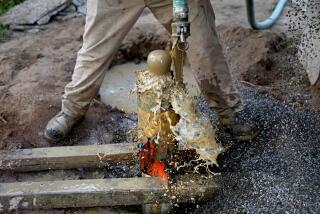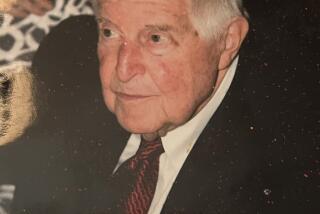Former State Senate Leader Hugh Burns Dies at Age 86
SACRAMENTO — Funeral services are pending for former Senate President Pro Tem Hugh M. Burns (D-Fresno), a co-author of the landmark legislation that authorized the California Water Project.
Burns died Saturday at his Sacramento home after years of deteriorating health. He was 86.
A master politician, Burns was a burly, friendly man who presided over the Senate when it resembled more a bipartisan gentlemen’s club than the strongly partisan political body it is today.
He was the first Democrat to lead the Senate in this century and held the post for 12 years, longer than any other Democrat and the second longest in state history. Arthur H. Breed (R-Oakland) still holds the Senate pro tem longevity record--17 years from 1917-1934.
During his reign--an era when the Legislature chalked up significant accomplishments--Burns also sponsored major bills laying the groundwork for construction of the state freeway system and allowing counties to levy sales taxes.
The California Water Project, approved by voters in 1960 when they passed a $1.75-billion bond issue, resulted in the shipment of surplus Northern California water to Southern California. The project was triggered by the Burns-Porter Act, sponsored by Burns and the late Assemblyman Carley V. Porter (D-Compton).
“I don’t think any governor had as much influence on legislation as Hugh Burns did as pro tem,” former Democratic Gov. Edmund G. Brown said as he was leaving office.
Burns led the Senate at the same time that the late Jesse M. Unruh (D-Inglewood)--another legislative giant--reigned over the Assembly as Speaker. They had a friendly, cordial relationship, but Burns in 1970 refused to endorse Democrat Unruh for governor against Republican Gov. Ronald Reagan.
“My support for Gov. Reagan does not mean I have chosen to desert the Democratic Party,” Burns insisted. “It simply reflects my belief that some Democratic Party leaders are on a course contrary to the best interests of the people of California.”
The outspoken maverick Democrat also endorsed Republican Richard M. Nixon for President in 1968, contending that the fiscal policies of Democratic President Lyndon B. Johnson “had failed to work,” causing serious money problems for both state and local governments.
A mortician, Burns was first elected to the Assembly in 1936 and to the Senate in 1942. He took over leadership of the upper chamber in 1957 and ultimately was ousted from his powerful post in 1969 by political “reformers” rebelling against special interest influence of the Senate’s “old guard.” Burns was replaced by Sen. Howard Way (R-Exeter).
Burns also served for several years as chairman of the controversial Senate Fact-Finding Subcommittee on Un-American Activities.
After he retired from the Senate in 1970, Burns was appointed to the state Alcoholic Beverage Appeals Board by Reagan. Burns served six years in that job.
As Senate leader, Burns liked to invite early morning visitors to his state Capitol office to have a brandy coffee or two with him. In his later years, he frequently told people: “If I had known I would have lived this long, I would have taken better care of myself.”
Burns’ wife, Wilma, said he died peacefully in his Sacramento home. “He just shut his eyes and went to sleep,” she said.
Besides his wife, Burns is survived by a daughter, Collene Draklich.
More to Read
Get the L.A. Times Politics newsletter
Deeply reported insights into legislation, politics and policy from Sacramento, Washington and beyond. In your inbox three times per week.
You may occasionally receive promotional content from the Los Angeles Times.










